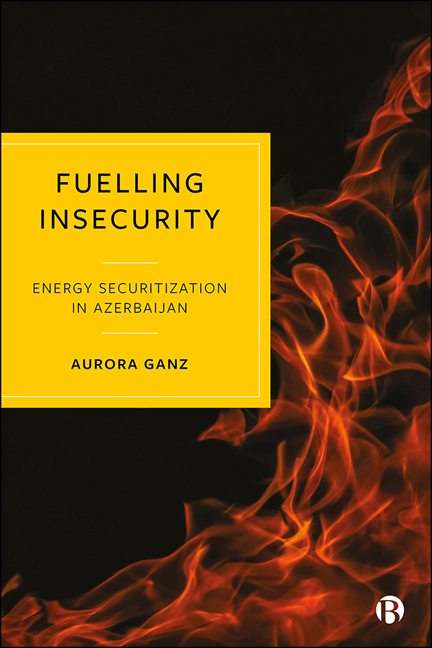Book contents
- Frontmatter
- Dedication
- Contents
- 1 Introduction
- 2 An Analysis of Actually Existing Energy Securitizations
- 3 Energy Securitization in the Land of Fire
- 4 Everyday Practices of Energy Security in Azerbaijan
- 5 Beyond the National Borders: NATO and Energy Security in Azerbaijan
- 6 Energy Securitization and the Private Sector: The Case of BP
- 7 Energy (In)Securitization: Abusive Security Practices and Poor Energy Choices
- 8 Conclusion
- References
- Index
3 - Energy Securitization in the Land of Fire
Published online by Cambridge University Press: 13 May 2022
- Frontmatter
- Dedication
- Contents
- 1 Introduction
- 2 An Analysis of Actually Existing Energy Securitizations
- 3 Energy Securitization in the Land of Fire
- 4 Everyday Practices of Energy Security in Azerbaijan
- 5 Beyond the National Borders: NATO and Energy Security in Azerbaijan
- 6 Energy Securitization and the Private Sector: The Case of BP
- 7 Energy (In)Securitization: Abusive Security Practices and Poor Energy Choices
- 8 Conclusion
- References
- Index
Summary
In Azerbaijan, oil and gas pipelines draw a parallel topography, running across and beyond the national territory. Around the capital city of Baku, onshore and offshore drilling platforms shape a singular skyline. In the Absheron peninsula, Baku's region, oil-well derricks in succession populate the dry, semi-desert steppe, creating suggestive lunar landscapes. There lie the largest oil and gas deposits. One can smell exhaust gas even from the city. The soil in the Absheron peninsula is so rich in gas that it generates spontaneous fires every time it leaks to the surface. This inspired the country's brand: Azerbaijan, ‘the Land of Fire’. On the hillsides, particularly on the Yanar Dag mountain, flames blaze continuously due to natural combustion. In the surrounding areas of the Absheron peninsula, it is not rare to spot oil ponds, residual barrels, and sewage; these are signs of the pollution that contaminates large parts of Azerbaijan's territory. Driving 50 kilometres south of the capital city, in a dusty, rocky and sandy area, the highway passes by the Sangachal terminal, a vital link of the country's oil and gas industry and one of the world's largest oil and gas terminals. The terminal, which – at the time of writing – is still under expansion, currently covers about 550 hectares and is connected to the four main gas and oil pipelines that cross the land. Among them, the Baku–Tbilisi–Ceyhan pipeline is the second-longest pipeline in the world and runs along 1,760 kilometres from Azerbaijan to Turkey through Georgia, more than half of it underground. Called ‘the pipe-dream’ throughout the 1990s, the construction of the BTC finally began in 2002; it was inaugurated in 2005 and started operating the following year. Other pipelines include the Western Route Export Pipeline (WREP), which since 1999 has transported oil from the offshore Chirag field in the Caspian Sea to the Supsa terminal in western Georgia, and the Baku– Novorossiysk pipeline (NREP), which was inaugurated in 1997 and runs north for 1,330 kilometres from the Sangachal Terminal to the Novorossiysk terminal on the Russian Black Sea coast.The South Caucasus Pipeline (SCP; also called BTE – Baku–Tbilisi–Erzurum) exports gas from Azerbaijan Shah Deniz to Georgia and Turkey, following the BTC oil route.
- Type
- Chapter
- Information
- Fuelling InsecurityEnergy Securitization in Azerbaijan, pp. 52 - 75Publisher: Bristol University PressPrint publication year: 2021



